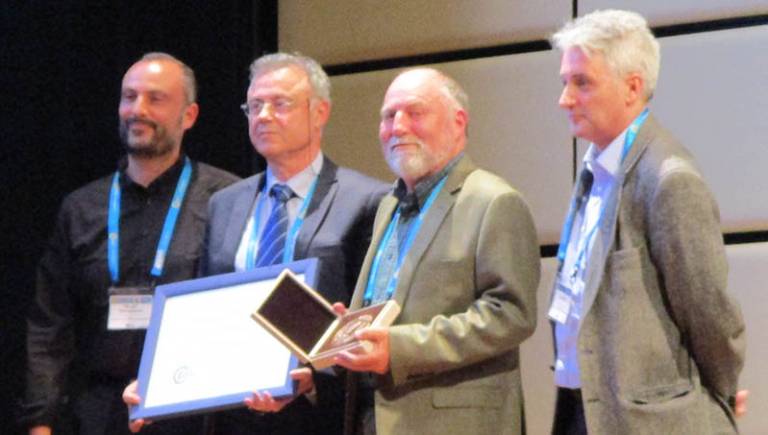EGU 2016 Awards: Louis Néel Medal
24 April 2016
Prof Phil Meredith received this award for his contributions in rock physics and geomechanics and for his role in stimulating international collaboration and interdisciplinary research. On 19 April, Phil Meredith was awarded the 2016 Louis Néel Medal at the European Geosciences Union Assembly in Vienna. The award recognises outstanding achievements in rock magnetism, rock physics and geomaterials. In his citation, Ian Main, from the University of Edinburgh, highlighted how Phil has pioneered an entirely new, holistic approach to experimental rock physics and how the rock-physics community has benefited enormously from his unselfish co-operation in research: “He is a lively, deeply thoughtful and generous collaborator, serious about his work, but fun to be with.”

This medal has been established by the Division on Magnetism, Palaeomagnetism and Rock Physics in recognition of the scientific achievements of Louis Eugène Felix Néel, who shared the 1970 Nobel Prize of Physics for his fundamental research and discoveries concerning antiferromagnetism. This medal is reserved for individuals in recognition of outstanding achievements in rock magnetism and rock physics & geomaterials.
Philip Meredith has made fundamental and seminal contributions in experimental rock physics, in relation to a diversity of basic and applied problems in crustal dynamics, natural energy resources and volcanology. A major theme of Meredith’s research for over three decades has been the time-dependent behaviour of brittle rock deformation. He was instrumental in defining the experimental protocol for the fracture mechanics investigation of this phenomenon. With Barry Atkinson, he conducted some of the most careful and systematic investigations in the laboratory. Their collaboration culminated in the monograph on Fracture Mechanics of Rock, which is recognised as the definitive work in this area.
Meredith made important contributions in two related geomechanics problems on different scales. First, his group conducted a comprehensive investigation of acoustic emission activity in relation to the development of failure, and in particular, the temporal characteristics and connection with subcritical crack growth. In collaboration with Ian Main, he synthesised the laboratory data and proposed a number of innovative ideas regarding the temporal evolution of seismicity and underlying mechanisms. Second, his group recently undertook a systematic investigation of the ‘brittle creep’ behaviour of reservoir rocks. These investigations have elucidated the overall behaviour in relation to dilatant and compactant failure, as well as the micromechanical bases.
A second theme of Meredith’s research has been the brittle failure and fracture mechanics characteristics of rocks under elevated temperatures, with a focus on volcanological and geothermal applications. These studies have provided important constraints on the dynamics of volcanic system and related seismicity.
In his research, he has been proactive in linking colleagues of multiple disciplines located worldwide, including Europe, North America and Japan. He has been particularly effective in mentoring tens of doctoral students and postdoctoral fellows, many of whom have successfully established their careers in academia and industry all over the world.
 Close
Close

